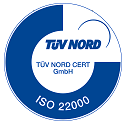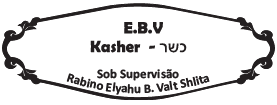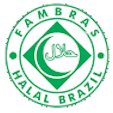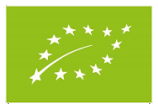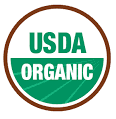Certificates
ISO 9001 is an internationally recognized standard that certifies the quality management system of organizations and defines the requirements and standardization tools needed for the implementation of this system in our company. The goal is to give the customer confidence that the products and services offered by the company comply with a quality standard.
ISO 22000 is an internationally recognized standard that defines the requirements of a food safety management system, covering all organizations in the food chain, from start to finish. One of the objectives of this certification is to globally align the requirements for food safety management.
HACCP is a quality certification for food product companies. It is based on an orderly analysis to identify, analyze and control hazards associated with food production, distribution and consumption. This certification is also based on risk verification procedures and the definition of critical limits that need to be controlled and monitored.
ESG-FIEC
KOSHER or KASHER is a certification that complies with the laws of kashrut (dietary law), and originates from the Jewish holy book, the Torah and the Talmud (the set of books that defines the code of Jewish laws, including dietary requirements). These books name a number of foods that cannot be eaten by the Jewish people. For this reason, it was necessary to create a certification for Torah followers so they can be confident that the products have a guarantee. The definition of how to use the most varied modern technologies and which products are in accordance with the Torah standards are defined by rabbinical writers. All food consumed by Torah followers must be kosher.
HALAL is a certification that includes all foods that are permissible by Halah for human consumption according to Islamic belief. It is important to understand, however, that the Muslim holy book, the Quran, does not contain a list of Halal foods but rather a note of Haram (forbidden) elements. Muslims are forbidden to consume them directly or indirectly. They cannot consume food containing raw materials and/or by-product and/or deriving from a process and/or any cross-contamination with items designated as Haram. The certifier ensures that the entire production process of the certified company is in compliance.
ORGANIC
The certification of ORGANIC products is a procedure whereby a certifier, duly accredited by the Ministry of Agriculture, Livestock and Supply (MAPA) and accredited by the National Institute of Metrology, Standardization and Industrial Quality (Inmetro), ensures in writing that a certain product, process or service complies with the rules and practices of organic production:
Meets all organic certifications issued by IBD (Organic Product Certifier) in the Brazilian market and is used in conjunction with the Brazilian Organic Products seal.
Meets all certifications made for the European Common Market, and IBD is accredited with equivalent standards, and IBD Guidelines approved by European accreditors as equivalent to the European standard.
Meets all certifications made for the North American Market (USA), and IBD is accredited to use the USDA/NOP standard, along with no other.
ECOVADIS
Carnaúba Do Brasil Was The First Company In The Carnauba Wax Sector To Obtain A Gold Medal In The Ecovadis Certification.
EcoVadis provides holistic sustainability ratings service for companies, delivered via a global cloud-based SaaS platform.
The EcoVadis Rating covers a broad range of non-financial management systems including Environmental, Labor & Human Rights, Ethics and Sustainable Procurement impacts. Each company is rated on the material issues as they pertain to their company's size, location and industry.
These evidence-based assessments are refined into easy to read scorecards, providing zero to one hundred (0-100) scores, and medals (bronze, silver, gold), when applicable. Additionally, the scorecards provide guidance on strengths and improvement areas, which the rated companies may use to focus their sustainability efforts and develop corrective action plans to improve their sustainability performance.
To drive global supply chain sustainability, large multinational corporations partner with EcoVadis, leveraging the influence of spend as a “force for good“ to push trading partners beyond compliance. The rated company can see how their score compares to the benchmark in their industry. Combining the scorecard results with improvement areas results in a “race to the top,“ in which whole industries compete to achieve global best practice.
Through the Enterprise subscription and associated services, EcoVadis provides an outsourced sustainability management platform that helps large organizations to: invite their trading partners to be rated; manage trading partners' performance; drive continuous improvement.
To date, EcoVadis has rated over 75,000 trading partners worldwide, mitigating risk for some of the world's largest organizations, while positively impacting the environment, fostering transparency and driving innovation.).
To Be Evaluated And To Obtain Good Results In The Ecovadis Evaluation Is To Be At The Forefront In Matters Of Social Responsibility.


